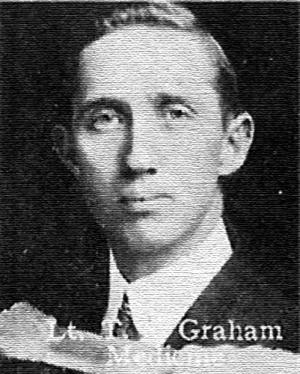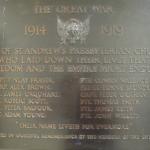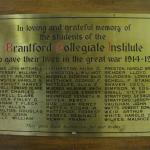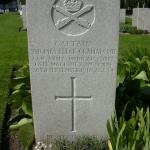Circumstances of Casualty: Died (Cardiac failure and exhaustion, following severe Sciatica) at No. 8 General Hospital, Rouen.
BX September 24, 1918
Captain Thomas Fleck Graham Died Suddenly – “Fleck” Graham was Well and Favorably Known in the City
Another bright, young promising Brantford life has been added to the terrible toll of the world catastrophe. Capt Thomas Fleck Graham has made the great sacrifice, according to a cablegram received yesterday by the family. The brief poignant message was from the commanding officer of the 31st Stationary Hospital, France, and announced that Capt. Fleck Graham had died suddenly. The commanding officer further stated that a letter with particulars followed.
“Flake” Graham as he was familiarly known to his Brantford friends, had friends everywhere throughout the city and county. He had a fine career at the Brantford Collegiate Institute, and Toronto University, where he graduated in medicine just before the war broke out. When hostilities commenced he was in New York taking a post-graduate course in hospital. He heard the call of Empire and hastened home to enlist in the 86th Machine Gun Battalion. Just prior to that unit proceeding overseas, Capt. Graham was severely injured in the railway wreck at Charbot Lake, and he received injuries to his back, which might well have kept a less determined young man out of the service. Capt. Graham got to England, where he did sterling work in hospital, despite the fact that he had to wear a Plaster of Paris cast for over a year. He went to France last March, where he had been serving at the Third General Hospital. This was the hospital where Miss Baldwin of Paris was killed with other Canadian nurses by Hun bombs, Capt. Graham being there during the outrage. A month ago the roommate of Capt. Graham was killed and he lost all his personal effects through the Hun aircraft bombing the hospital. A week following that incident there was quite a number killed. In writing home Capt. Graham was ever most cheerful of all things. In one letter he expressed the belief that if he met the almost inevitable death in France he felt that he had been of use to humanity just as much as if he had returned and lived to be an old man in Brantford. That was the spirit of his service.
His mother, Mrs. Alex Graham, 269 Clarence Street, and members of the family, were greatly shocked on receipt of the sad intelligence yesterday. Fleck was always a popular favorite, and prior to his going to College, he was a familiar figure every Saturday on the Brantford market. He belonged to St Andrew’s Church, where he was deeply esteemed. The sorrowing mother and brothers and sisters, the sympathy of a wide circle of friends will be extended. The family includes three brothers, Alex, registrar of the city; John, at home; Hugh, Ottawa, and Mrs. Garvick and Mrs. Buckman both of Ottawa.
BX October 15, 1918
Overwork After Great Drives Was Cause of Death – Captain Thomas Fleck Graham had Continued at His Post to the Last – Details of Death
Details of the death of the late Captain Thomas Fleck Graham have been received by the family here in a letter from the officer commanding the No. 2 Canadian Stationary Hospital. This shows that he died of overwork, following on the drives immediately preceding his illness. The letter follows:
Mrs. Graham,
Brantford, Ontario Canada
Dear Mrs. Graham,
By the time this letter reaches you, you will have received my cable message informing you of the loss of your son, Capt. T. Fleck Graham who died suddenly in No. 8 General Hospital on the night of September 19-20.
On behalf of myself and staff I would ask you to accept our deepest sympathies in your great loss. You have lost a son of whom you may indeed be very proud and as Commanding officer, I have lost a very valuable officer and personally one whose friendship I valued very highly.
While with us by his devotion to duty, he endeared himself to all the patients who were fortunate enough to come under his care and by his cheerfulness and kindly thoughts of others he became a general favorite. Possibly you would like to know a little of the work he was doing with the unit. He was in charge of the resuscitation and wounds of the chests wards. This work required very great skill as the patients were all seriously wounded on admission and were in a serious condition. At all hours of the day or night and with complete disregard for personnel safety when the Hun planes were overhead and threatened to drop bombs he carried on his work so successfully that many soldiers whose life might be said to hang by a thread were saved and the patients subsequently returned to their homes in England.
As doubtless you know we are but in rest at present. I had to arrange with your son that when we resumed duty as a hospital he was to take charge of the medical division. This would have given him several hundred patients for whom to care and he would have had under him medical officers to work as he directed.
At the time he was taken ill I was in England. Immediately on my return I called on him. He was quite cheerful and seemed to be making good progress. He spoke about returning to his work to which he was looking forward with great pleasure. Another Canadian officer saw him at 3.30 o’clock that same night and later on he was visited by the medical officer who was attending him, who found him in good condition. Your son had a very nice room which was filled with beautiful roses and other flowers. He told me that he lacked for nothing and they had been exceedingly kind to him. In the morning we received the news of his death. I am awaiting a report as to its cause and I will let you know in another letter.
The funeral was held to the St. Saver cemetery, which is situated on the lull overlooking the city of Rouen. It is the cemetery used by the French, but they very kindly permitted a portion of it to be used by the Allies. His grave is situated in a very pleasant spot. Photos have been taken which I will forward as soon as I receive them.
He was buried with full military honors. The band was supplied by an English regiment, as was also the firing party. The whole unit attended the services, which were taken by Rev. Capt. Kennedy, chaplain, who will be writing to you. The whole ceremony was very beautiful. Canadian and other headquarters were represented. English, Australian, United States and other officers united with us in paying respects to a fellow officer. The floral tributes were many and beautiful as you will see by the attached list. At the conclusion of the service Bugler A. Morrison of this unit, sounded “Last Post.” The cemetery is St. Saver cemetery, Rue d’Elbeuf. His personal effects are being sent to you but as they have to pass through many channels they may take some time in arriving.
If there should be anything which you would like to know kindly let me know. My own home town London, Ontario, is not far from you and when I return, I will take the earliest opportunity to call in order that I may tell you many things which in a letter one finds so difficult.
Again, repeating our deepest sympathies to yourself and the members of your family.
Yours sincerely,
Clifford H. Reason
Lieut.-Col. C.A.M.C. Commanding No. 2, Canadian Stationary Hospital
Floral tributes to the late Capt. T.F. Graham No. 3 Canadian Stationary Hospital;
Wreath from Officer Commanding and Staff, No. 3 Canadian Stationary Hospital; Floral Cross from Personnel No. 2 Canadian Stationary Hospital; Sheath from Officer Commanding and staff of No. 7 Canadian Stationary Hospital; Wreath from Officer Commanding and Staff No. 8 British General Hospital; Wreath from patients No. 8 British General Hospital; Wreath from Nursing Sisters No. 8 General Hospital; Wreath from Personnel of No. 8 British General Hospital; Wreath, anonymous.
In a letter received in the same mail as the above a fellow doctor states that Dr. Graham went to bed exhausted from the work of the recent drives, that when the nurse visited him at four a.m. he appeared stronger, but when she returned two hours later he was dead.




